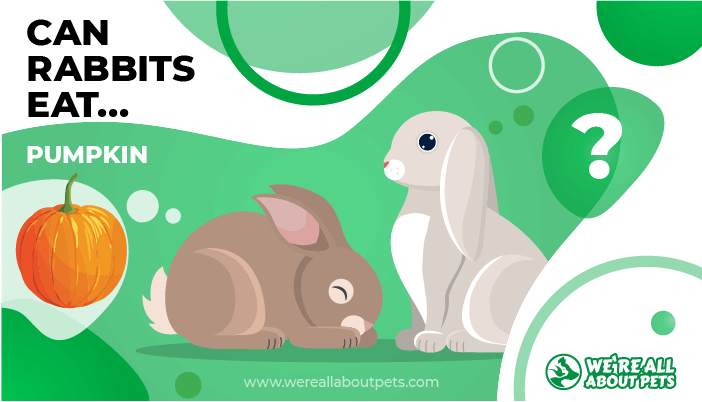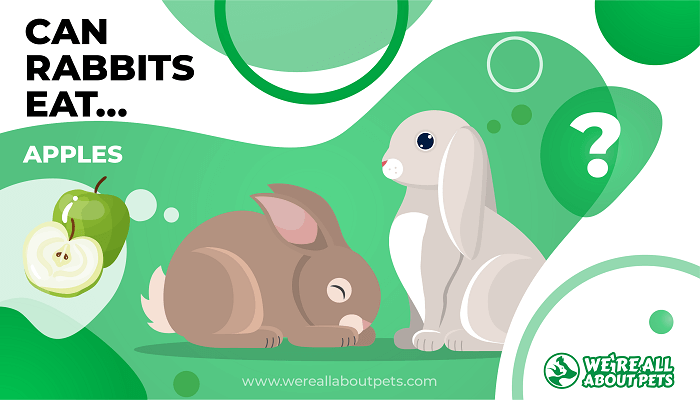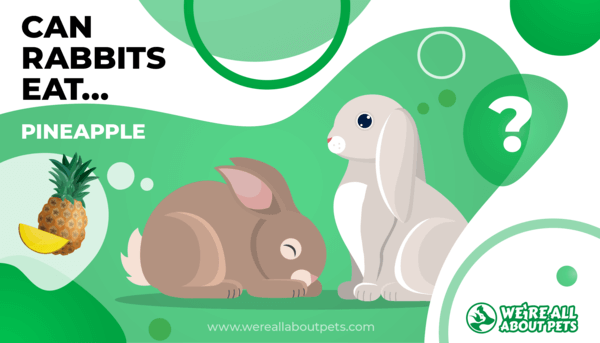Rabbit Pregnancy 101: Signs, Symptoms And Care
This page contains affiliate links. We may earn money or products from the companies mentioned in this post through our independently chosen links, which earn us a commission. Learn More
Rabbits are well known for their potential to produce large amounts of offspring quickly, but there is a lot more to know if you own a female rabbit and want to learn about the ins and outs of pregnancy.
Here is our handy guide to everything you might need to know!
Age Of Maturity
Female rabbits are called does, and they reach sexual maturity, and therefore able to mate and have young rabbits, at around 12 weeks of age. Smaller breeds will mature slightly earlier than larger breeds. They can continue to have successful pregnancies until they are around 4 years old.
How Long is a Rabbit Pregnancy?
Rabbits mate at any time of year, they do not come into season. The length of rabbit pregnancy last around 31-33 days. Does can get pregnant again just hours after having a litter, so they can have over 10 litters in a year, although this puts a significant pressure on their bodies, with around 8 litters/year being much healthier for them.
Signs & Symptoms of Pregnancy in Rabbits
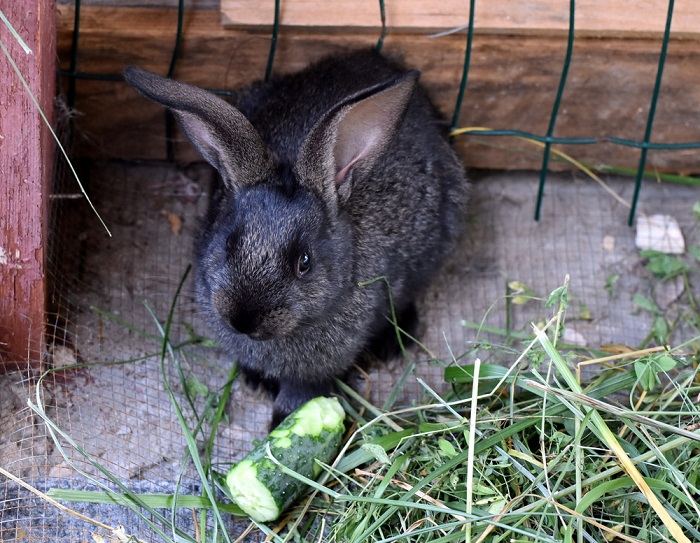
Does sometimes don’t look obviously pregnant, so it can be hard to tell. Here are some early signs of rabbit pregnancy to look for:
- Large belly – this can be subtler than you might think, and in the fluffier breeds can be difficult to spot.
- Palpation – you may be able to feel marble-like small balls in their belly, these are the fetuses.
- Behaviour changes – pregnant does can withdraw, not wanting to be touched and can even become aggressive.
- Nest-building – pregnant rabbits will spend much time building a comfortable nest from hay or straw. Nesting behavior usually starts around a week before birth.
- Fur-pulling – pregnant does pull out their own fur to use to keep the young rabbits warm when they are born.
Occasionally female rabbits may dig a burrow to give birth in. If you notice this, provide a safe nesting space for them instead.
If you think your rabbit may be pregnant, take her to your veterinary surgeon who will be able to confirm for you. Rabbits can occasionally display false pregnancies, where they show the signs of pregnancy such as nesting, but are not actually pregnant.
Caring For A Pregnant Rabbit
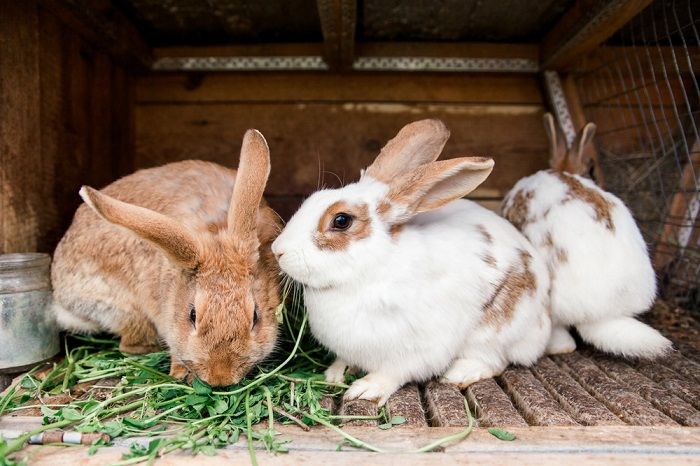
Pregnant rabbits will need plenty of space – not only for their nest, which can be a decent size, but also because they may have a large litter, and so may need space for over 10 baby rabbits!
A large enclosure or hutch with a nest box would be perfect, with lots of room for baby bunnies. Plenty of suitable nesting material should be available.
Breeding rabbits will also need more food than usual, both whilst pregnant and when feeding their kits. Plenty of fresh vegetables should be offered alongside their usual pellets and hay. Alfalfa hay is perfect for feeing pregnant does, but make sure to switch over from usual hay gradually over a few days to prevent an upset stomach. Fresh water in a bowl should be always available.
Labor And Birth
The process of birth in rabbits is called kindling. It is usually very quick (around 15 minutes) and often occurs overnight or in the early morning. It is extremely rare for any intervention to be needed. Try to avoid any disturbance of the nest around birth and the first few days, this can distress the doe and cause her to abandon the nest, or even become aggressive towards the baby bunnies.
Mother rabbits often like to have some space apart from their kits – in the wild, this serves to draw predators’ attention away from the nest. Provide a suitable area for the doe to be safely away from the baby bunnies, who will remain in the nest box. Remember, does can get pregnant again immediately after birth so keep her away from any male rabbits (bucks) to avoid her getting in kit again too quickly.
Taking Care Of The Baby Rabbits
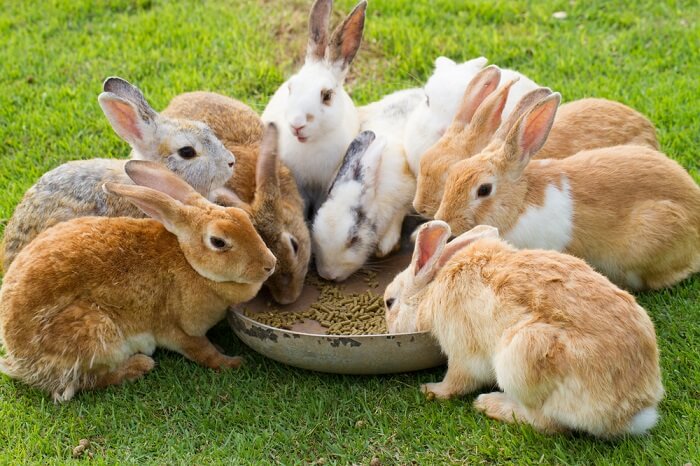
Baby rabbits are called kits. They are often born in large litters, with around 6-7 babies being average but they can have up to 13 or 14!
Young rabbits are born blind and deaf. The mother rabbit will feed them twice a day around the early morning and early evening, and they will wean from their mother around 4-6 weeks of age and can leave their mother around 8 weeks old.
It is rare for the kits to need any intervention from humans. Care must be taken when handling not to interfere with the doe-kit bond. Baby rabbits should gain weight rapidly – around ¼ ounce daily, and should have a nice round belly after a feed. If they do not seem to be feeding enough, you can supplement with a specially designed formula via bottle, but this is very rarely needed.
Preventing Pregnancies In Rabbits
If you have a female rabbit who is at least 3 months old, and not spayed, they can get pregnant. There are two ways to prevent this if you want to avoid a whole heap of baby bunnies – prevent any contact with an unneutered male rabbit, or consider a neuter operation.
Spaying of a pet rabbit is done by a veterinary surgeon under general anaesthesia, and both the uterus and the ovaries are removed. The procedure is not without risk, but it does prevent pregnancy and also prevents certain types of cancer and illness that rabbits can be prone to.
Having a discussion with your veterinary surgeon is the best way to decide if this is the best thing for you and your rabbit.
Frequently Asked Questions
What are the signs of a pregnant rabbit?
Pregnant rabbits will have an enlarged belly and may become antisocial. They will build a nest and may pull out their own fur to line it with.
What time do rabbits give birth?
The gestation period for rabbits is around 31-33 days. They usually give birth in the early hours of the morning.
Do rabbits get pregnant every time they mate?
Rabbits are not seasonal breeders, they can indeed get pregnant whenever they are mated. They are fertile from approximately 3 months of age, and can get pregnant again immediately after giving birth.
How long is rabbit labor?
Rabbit labor (or kindling) is extremely quick, and rarely lasts more than 15-20 minutes.

